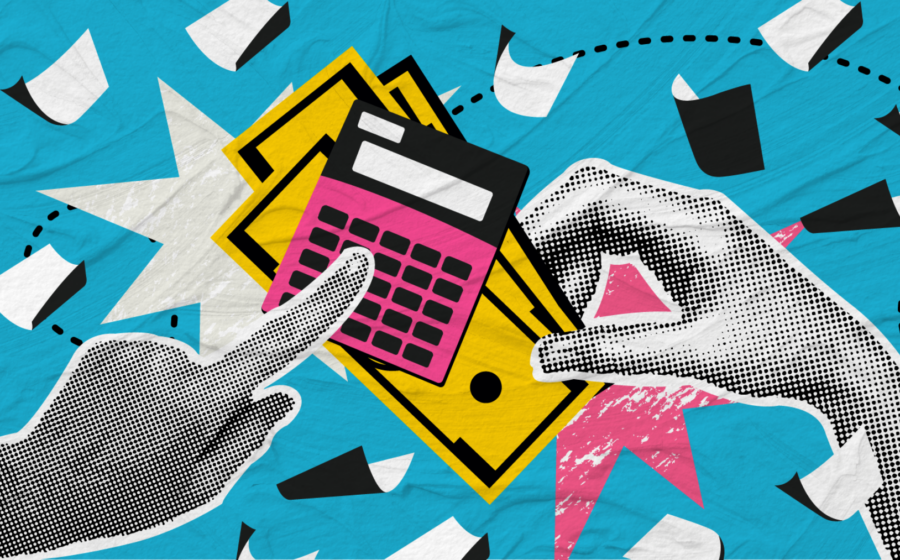Spring evokes thoughts of floral-flavored lattes, enjoying coffee outdoors, and making the shift from hot to iced drinks. But it isn’t all sunshine and rainbows: This time of year also spells the return of Tax Day.
If you feel anxiety, you’re not alone: 65% of Americans report feeling stressed about tax season, and being an hourly waged worker who collects tips can make filing taxes even more confusing. Baristas and other coffee workers likely have a lot of tax questions, including: Should I file myself or hire a professional? Am I doing this correctly? If I do it wrong, will I get audited? Will I get a refund or end up owing money?
Given the uncertainty surrounding the current political climate and the looming recession, this year’s tax season is a particularly prudent time to assess your financial situation and make sure that there are no surprises going forward.
To help, we asked tax professionals and human resource experts how hourly coffee workers need to think about their income—and ensure they file their taxes smoothly and correctly. With their tips, tax season can be a breeze—and you can go back to enjoying your warm-weather coffee that much faster.
A note: All information listed below is for educational purposes only and should not be construed as formal legal or financial advice.
Cross Your T’s and Dot Your I’s
According to Emmie Mathes, HR director at Grit Coffee in Charlottesville, Virginia, the first step in getting ready to file taxes is to get organized.
[Disclosure: The author works as a shop lead at a Grit Coffee location.]
Employers are required to send tax forms by a certain date (either electronically or by mail), so make sure you keep everything together and organized. “I have a folder for each tax year,” says Mathes. “Any tax forms like W-2s, tuition statements, investments/interest statements, all get stored in one folder.”
Once you organize your documents and file your taxes, don’t throw anything away. According to Forbes, it’s best to hold onto tax documents for three years, as the Internal Revenue Service (IRS) can perform audits up to three years after a filing. Keeping all that information in one place can help prevent any future uncertainty.
While many websites like TurboTax can import your tax information from one year to the next, Greg Bures, controller at Grit Coffee, cautions workers to make sure they know which documents they have, and that their information is accurate and updated. “I can’t stress enough the importance of regularly reviewing (at least annually, and anytime a big life event happens) W-4/VA-4 entries,” he says, referring to documents employees file with their employers to indicate how much money should be withheld from their paychecks and set aside for taxes. (Virginia also requires people to fill out a VA-4; check with your state to see if additional documentation is needed.)
Bures has seen workers end up with surprising tax bills in April because they filled out their W-4 incorrectly. “The worst mistakes I’ve seen is when someone accidentally selects tax-exempt for either federal or state, and then finds out when filing taxes that they owe several thousand dollars,” he says.
“Also, know the deadlines,” Mathes says. Tax Day is almost always on April 15, but“sometimes that date gets shifted due to holidays or weekends. Always check the year of to make sure.”
Utilize Resources To Save You Money
While you can also do so by mail, filing your taxes electronically is generally the easiest way to proceed. If you are confident that your taxes are straightforward, there are free resources available, like FreeTaxUSA or, if you earn less than $79,000 per year, the IRS Free File program. The Free File program uses guided tax software and fillable forms that will support all tax situations and offers assistance with federal and state preparation and filing. Meanwhile, The IRS Direct File pilot program is currently available in 25 states, and lets users file directly through the website without separate software and supports most tax situations and connects to a free state filing tool.
Some people, depending on the complexity of their jobs and gig work, may want to hire additional help through programs like TurboTax or H&R Block. Meanwhile, VITA, or the Volunteer Income Tax Assistance program, is offered by the IRS and helps low- and middle-income earners file their taxes for free; it’s worth checking if it’s available in your area.
The U.S. Bureau of Labor Statistics estimates that 5.3% of American workers have multiple jobs to pay the bills, which can make taxes even more complicated. To avoid incurring any fees or a potential audit, it is important to remember that the IRS requires any and all income to be declared when filing. The amount that each job pays will determine how to report that income.
For freelance work that produces less than $600 over the course of the year, you will not usually receive a W-2, and earnings will need to be declared through the use of 1099-MISC or 1099-NEC forms. If you hold multiple hourly jobs, your employers should submit all tax documents in the mail or electronically through whichever payroll companies they use.
What About Tips?
Every tax professional interviewed for this article pointed to tips as something to consider carefully when filing taxes. “For most baristas, there shouldn’t be major surprises during tax season, as tips should be included on their paychecks throughout the year,” says Jennifer Posner of JD Posner Business Solutions, an accounting and HR service that focuses on small-to-medium-sized businesses in the food and drink sector. “Employers are required to collect and withhold taxes based on the tips that employees report.”
However, each business handles tips differently. “From my experience, most baristas and restaurant employees underreport cash tips, simply because it’s difficult to track and they want to minimize their taxable income,” Posner says.
However, Posner says that, “while underreporting is common, I’ve never personally seen someone penalized for failing to report tips—though that doesn’t mean it doesn’t happen. If someone was audited and the IRS could prove they received tips in excess of what they reported, I would assume fees could be assessed.” She cautions a “better safe than sorry” approach to claiming tips.
Tax season is difficult, for filers and tax professionals alike. The important takeaway is to stay organized and be as accurate as possible to avoid penalties or costly mistakes. By heeding tax professionals’ advice, and making use of digital resources, tax season can pass with less stress—and spring can go back to being about sipping on iced coffee in the warmer weather.
















